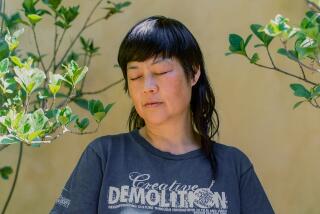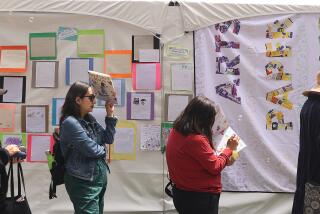3 Daughters of China : Books: Jung Chang’s grandmother was a concubine, her mother a member of the Communist underground. This is their story--and hers.
- Share via
Jung Chang’s 16th birthday is seared into her memory.
There had been no celebration. It was March 25, 1968, and her hometown of Chengdu, in southwest China, was engulfed in Mao Tse-tung’s Cultural Revolution. Red Guards raided her apartment repeatedly, searching for contraband books or other evidence of political incorrectness. Her parents, branded “capitalist roaders,” had been tortured, beaten and thrown into detention.
That night, while bullets flew between Red Guard factions and young rebels screamed diatribes over loudspeakers, a bold idea came to her.
“The propaganda constantly said that China was paradise on earth,” Chang, now 39, recalled recently. “That night, for the first time, I consciously thought: If this is paradise, what then is hell?”
This was, for Chang, a revolutionary thought. Despite the horrors inflicted upon her parents and thousands of other Chinese citizens during the Cultural Revolution, the young woman had never questioned her basic indoctrination as a Communist--or her virtual worship of Mao.
But that night proved a turning point--one of several in a remarkable life that Chang recounts in “Wild Swans, Three Daughters of China,” published last month.
Praised by critics for its honesty, detail and gripping style, the book is at once a tale of personal awakening, a family chronicle of three generations of women and a history of China that spans the seven decades leading up to the death of Mao in 1976.
The three daughters of China are Chang’s grandmother, who was sold as a concubine to a Manchu warlord; her mother, who became a member of the Communist underground, spied on the Nationalist Army and married a Communist guerrilla fighter, and Chang, who came of age during the tumultuous decade of the Cultural Revolution and served briefly as a Red Guard before being exiled to the countryside.
On a recent sultry afternoon, Chang was relaxing at a friend’s rustic Brentwood estate as she described her life and the events that spurred her to write “Wild Swans.”
Chang had left China in 1978 when she received permission to study in England. In 1982, she earned a Ph.D. in linguistics from York University, becoming the first person from the People’s Republic of China to obtain a doctorate from a British university.
She made regular trips back to China. Then, in 1988, Chang’s mother, De-hong, went to London for a long visit. It was during this trip--her mother’s first time in the West--that Chang began to hear unvarnished stories about her family’s past.
“I asked my mother about her life in China because we had the time and we were relaxed,” said Chang, in British-accented English. “When I was in China, it was under Mao, and it would have been impossible for her to talk, even to me. In London, we just started talking. We just talked for months and months.”
One of the first stories her mother told was about having to walk 1,000 miles from Manchuria to Sichuan while her father, a powerful member of the Communist Party, rode in a chauffeur-driven Jeep.
Her father was a veteran of Mao’s Long March and considered the trek to Sichuan, where he was being transferred, a test of De-hong’s own ideological commitment. When her mother complained of feeling ill, as Chang recounts in the book, her father told her she had a choice: “Either get into the car or get into the Party, but not both.”
Neither of them knew she was pregnant. About halfway through the journey, her mother suffered a miscarriage.
“She had bottled up a lot of things about my father,” Chang noted. “I think that’s definitely what triggered her to tell me more. She had this dilemma. On one hand, she admired and respected my father and understood his actions. On the other hand, she couldn’t forgive him.”
Chang understood her mother’s conflict, “and I think that was a very big thing for her,” she said. “She was so happy to find she could talk and be understood.”
The author said she knew “straight away” that she had a book to write. The research involved traveling through China to interview relatives and see the places where important family events occurred, like Manchuria, where her grandmother was born. Her mother, who still lives in Chengdu, accompanied her.
To verify names, dates and events, she also visited Taiwan to interview senior government officials about the Kuomintang, the nationalist political party that Mao drove from power in 1949, and she pored over documents in libraries and in official British archives.
China scholar Judith Shapiro, writing in the Washington Post, said Chang’s book is the first memoir in English by a child of high-ranking Communist cadre members and the best account to date of the “power struggles on the provincial level during the Cultural Revolution.”
But Chang said she hopes one of the main impressions the book will leave with readers is the innate strength of Chinese women.
Her grandmother Yu-fang was a beauty whose prime asset was considered to be her “three-inch golden lilies”--her bound feet. At 15, she was sold to Gen. Xue Zhi-heng, the chief of police in Peking’s warlord government, who made her the lowest-ranking of his several concubines.
Xue virtually imprisoned Yu-fang in a house in her southwest Manchurian hometown. He spent about a week with her after their marriage, then left for six years, returning only to father their child, Chang’s mother. Yu-fang lived for a while in his household in Peking, where she was subjected to the pettiness and cruelty of his other wives, and she plotted her successful escape while the general was on his deathbed.
After he died, Chang said, her grandmother married an elderly country doctor, who named her mother De-hong, which means wild swan.
Her mother was attracted to Communism in part because it promised to lift women from their traditional lowly status, Chang said. She held a number of leadership positions in local government, but she was constantly subjected to the suspicions of comrades because of her grandfather, the general, who would have been categorized an enemy of the revolution had he lived.
According to Chang, her mother was forced to attend more than 100 denunciation meetings. The author describes in the book one session when her mother was forced to kneel on broken glass for hours while others berated her.
During the Cultural Revolution, Chang’s father was accused of being loyal to the old party system. At one point, he became so disturbed by the widespread persecution of innocent people that he wrote a letter to Mao, appealing to him “as one Communist to another, to stop the Cultural Revolution.” He was arrested within three days and was in and out of detention camps for the next several years. He suffered a nervous breakdown and died in 1975 in disillusionment.
Chang became a Red Guard, along with millions of other Chinese youths who answered Mao’s call to “smash up the four olds”--old ideas, culture, customs and habits. As one of Mao’s young rebels, she participated in a raid on a teahouse.
But Chang drew the line at denouncing her parents. Sent to the countryside to be “reformed,” she was assigned the job of carrying goat droppings and human waste to the fields. She later worked as an untrained “barefoot doctor” and as a factory electrician.
It was during this exile to the edge of the Himalayas in 1969 that what she calls her blind belief in the Communist system began to collapse. She learned the cause of the famine that had ravaged China for a decade. She saw peasants ignore the harvesting of crops in order to fulfill the Great Helmsman’s order to produce steel by whatever means necessary--which included the melting down of household pots and pans.
“I had thought the famine was the result of natural disasters, but it was from the peasants that I learned the truth,” Chang recalled. “That information was very important for my own enlightenment.”
At that point, she began to hate the Cultural Revolution and, in particular, Mao’s wife Chiang Ching, “who had personally denounced my father,” recalled Chang, indignant at the memory. “But I didn’t dare to challenge Mao openly. I didn’t dare to even think about him. He was too frightening to even think about.”
The breakthrough came after a fellow student at Sichuan University showed her a copy of Newsweek. A line in an article leaped out at her. It said that Mme. Mao was her husband’s “eyes, ears and mouth.”
“I thought, ah, it is Mao who is behind all this suffering and devastation. That was the first time I consciously challenged Mao in my mind,” Chang said, savoring the memory. “It was a very, very big thrill.”
Sometime after Mao’s death in 1976, as restrictions on intellectuals began to be lifted, Chang said she began to entertain thoughts of studying in the West. Her department at the university announced a scholarship to study in England. Chang scored highest in the qualifying examinations but was not officially approved until her mother obtained papers declaring her dead father as “rehabilitated.”
She became the first person from her province in 30 years to be allowed to study in the West.
Once in England, “I felt almost immediately at home,” Chang said. “Though this was a strange place, like another planet, I felt it was a place where I could put my hair down and my feet up.”
She dared to go into a pub, have an English boyfriend and dance in public. But she took great pains to cover up her activities, wearing heavy makeup as a disguise and ducking under the car seat whenever she and her beau drove within a mile of the Chinese embassy.
Today, Chang is a professor at London University in the School of Oriental and African Studies. She supervises a course for British diplomats who are to be stationed in China. She also appears frequently as a commentator for British television.
She said that she hopes her book, with its unflinching accounts of the abuse suffered by her family, will not affect her ability to visit China in the future. She is encouraged by the fact that lines of communication to the West have remained open, despite the violent repression of democracy at Tian An Men Square three years ago.
“The trend of liberalization is irreversible,” she said. “China is an altogether different place from when I was there. You can direct dial to a Chinese home from wherever you are in the world. My mother can send me faxes from a downtown post office. A letter from the heartland reaches me in a week.
“The door has been opened and cannot be closed again.”
More to Read
Sign up for our Book Club newsletter
Get the latest news, events and more from the Los Angeles Times Book Club, and help us get L.A. reading and talking.
You may occasionally receive promotional content from the Los Angeles Times.











